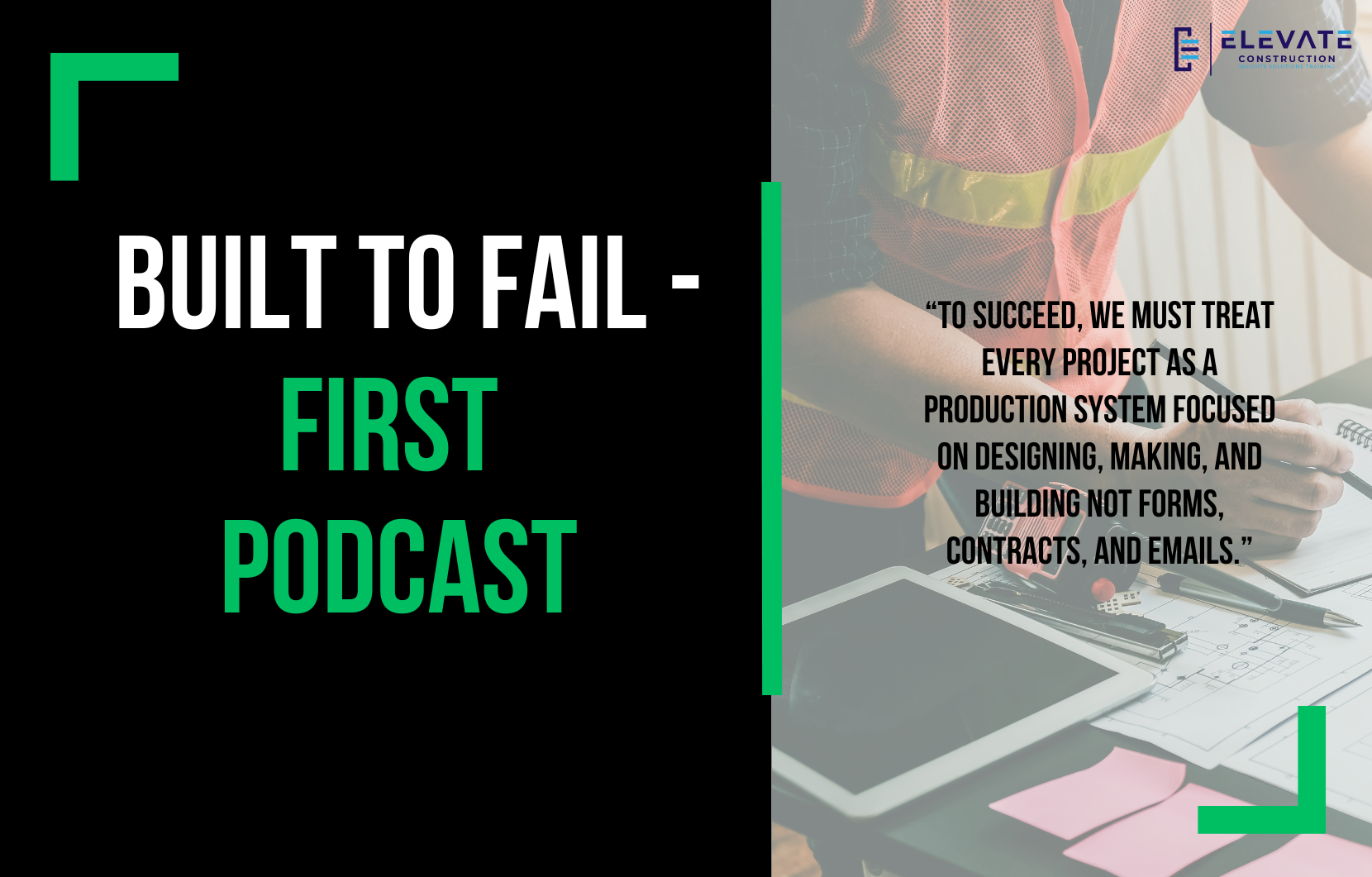Understanding Why Construction Projects Keep Falling Short
I’m starting a new blog series focused on Built to Fail by Todd R. Zabel. This book is a deep dive into why large construction projects consistently fail, despite smart, experienced teams and significant resources.
At Elevate Construction, our focus has been on understanding the construction system from owners and contractors down to superintendents, foremen, and now the worker level. The goal is to improve productivity by treating construction as a production system, not just a set of tasks.
I’ve been reorganizing my office to separate books I use for reference from those I need to study further. One of these books, Built to Fail, is not on Audible, so this blog series will also help me work through it and share insights along the way.
Construction Projects Are Failing Globally
Zabel’s first chapter, “A Flat Earth Mentality in a World That’s Round,” highlights the failures of mega projects:
- Berlin Brandenburg Airport: Eight years late, billions over budget, 120,000 defects at opening.
- UK’s Crossrail: Millions over budget, delayed multiple times, a transit project under central London.
- Purple Line Metro, Washington, D.C.: Four and a half years behind schedule, billions over budget, contractor quit.
Globally, the construction industry struggles with waste, inefficiency, and mismanagement:
- 31% of capital projects fail to meet cost or schedule.
- 48% meet either cost or schedule.
- Only 21% meet both.
- Just 9% meet cost, schedule, production, and production attainment.
The book emphasizes that contractors, regardless of size, operate with high risk and limited margins for error. Even well funded, experienced startups like Katerra fail when they don’t understand how to turn construction into a proper production system.
The Root Cause
Disconnect Between Planning and Doing
Zabel breaks down construction failure into eras:
- Era of Scientific Management: Frederick Taylor’s principles of efficiency separated planning from doing. Management measured and tweaked production stages, but disconnected from the work itself.
- Era of Predictability: Starting in the 1950s–60s, project management focused on administration and predictability rather than actual production. Layers of planners, lawyers, schedulers, and risk managers create bureaucracy that slows architects, engineers, and craftspeople.
- Era of Production (The Solution): Focus on designing, making, and building. Stop filling out forms, stop emailing endlessly, stop prioritizing contracts over production. Treat construction as a production system and manage it as such.
Zabel compares current practices to ancient sailors lost at sea, worrying about the wrong things while missing the bigger picture. Without a production focused approach, projects continue to fail despite technological and managerial advancements.
Why This Matters
Construction is not just about completing projects it’s about creating infrastructure that supports humanity’s needs. With global building floor area expected to double by 2060, and $100 trillion needed for net zero carbon goals, inefficiency is not just costly it’s a global problem.
Treating projects as production systems rather than administrative exercises is critical to meeting demand, reducing waste, and improving outcomes.
Key Takeaway
The construction industry consistently fails because it separates planning from doing and prioritizes administration over production. To succeed, we must treat every project as a production system focused on designing, making, and building not forms, contracts, and emails.
If you want to learn more we have:
-Takt Virtual Training: (Click here)
-Check out our Youtube channel for more info: (Click here)
-Listen to the Elevate Construction podcast: (Click here)
-Check out our training programs and certifications: (Click here)
-The Takt Book: (Click here)
Discover Jason’s Expertise:
Meet Jason Schroeder, the driving force behind Elevate Construction IST. As the company’s owner and principal consultant, he’s dedicated to taking construction to new heights. With a wealth of industry experience, he’s crafted the Field Engineer Boot Camp and Superintendent Boot Camp – intensive training programs engineered to cultivate top-tier leaders capable of steering their teams towards success. Jason’s vision? To expand his training initiatives across the nation, empowering construction firms to soar to unprecedented levels of excellence.
On we go

